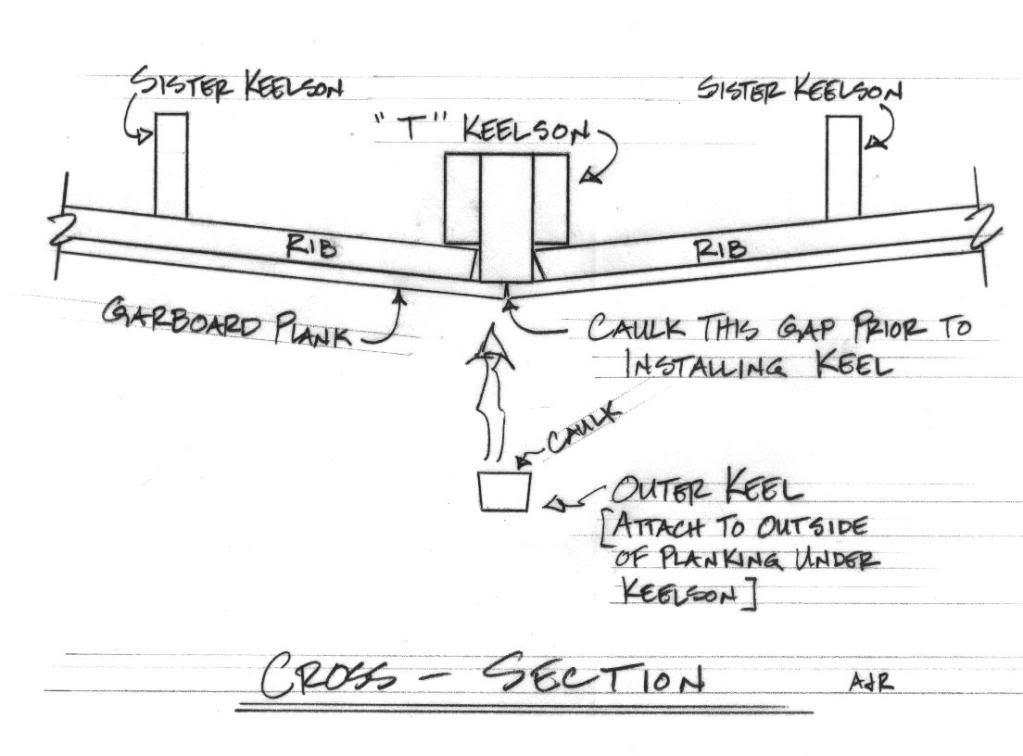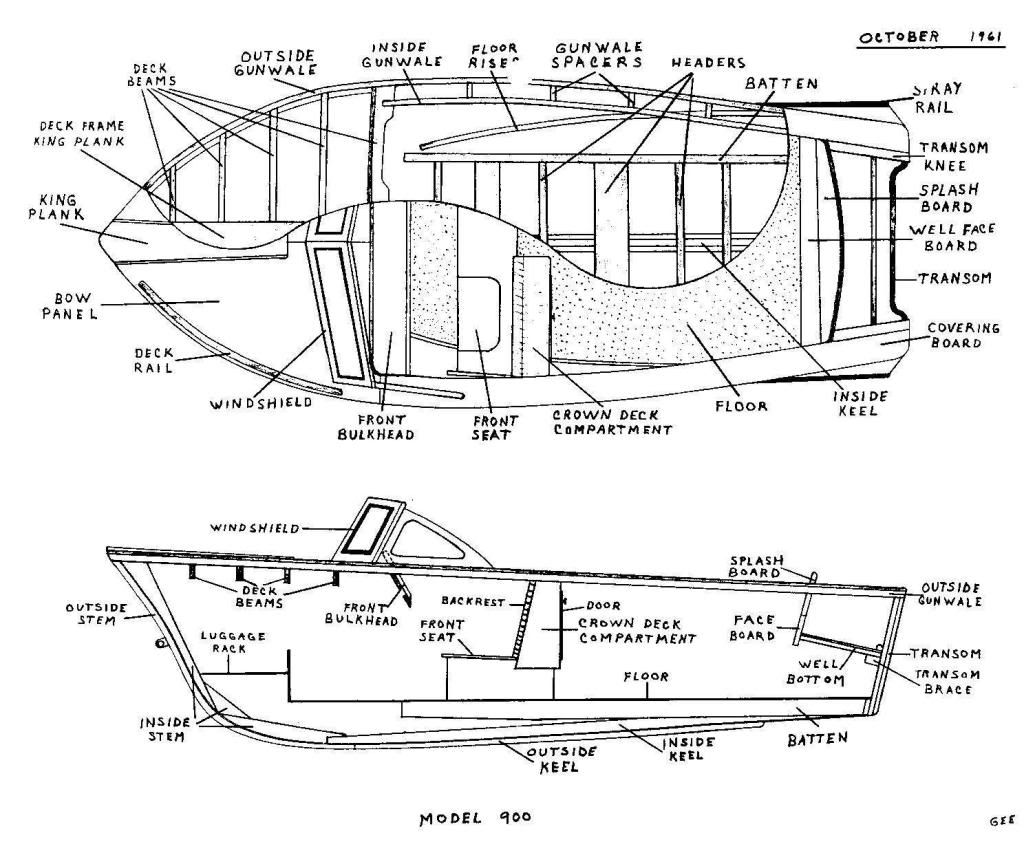Page 1 of 1
Nomenclature
Posted: Mon Nov 01, 2010 9:01 am
by THE LAKE
One of the hardest things for me in asking questions is knowing what to calll everything. For instance, I had thought the exterior keel was what you all were referring to when you used the term keelson, but a couple of recent posts have me thinking that the interior keel section is the keelson. So to begin, can somebody set me straight on that. The reason I ask is the next question. As I've posted elsewhere the interior AND exterior hull of my Cruisers Inc look to be in excellent condition. The only area of concern that I can see is the exterior keel. It basically looks like the previous owner(s) dragged the boat up on the beach all the time and it got chewed up. There is no metal strip on the very top (bottom) either. Before I got the boat under cover in my barn at the lake in Maine, we had one hell of a rainstorm. The boat filled up to about 2" above the interior keel with water - - - ALL of which seemed to run out the bottom of the boat at the lowest point of the exterior keel. So what would that indicate ? I am slowly making a punchlist for when I return to Maine in the spring and you folks have been wonderful in your comments and advice.
Thanks as always
Brian
Posted: Mon Nov 01, 2010 9:40 am
by Bill Montgomery
The keel is outside, the keelson is inside. I call the center 3 piece assembly the keelson and the two parallel boards are often called stringers, though I understand that's not the term Thompson used.
Posted: Mon Nov 01, 2010 10:41 am
by LancerBoy
Bill is correct.
Keel is on the outside of the planking. Keelson is on the inside. The keelson on your Cruisers and a Thompson is made up of three individual boards. The entire three piece assembly is the keelson. Stringers are main hull structural items that run parallel to the keelson about 12 to 18 inches either side of the keelson. Thompson called these sister keelsons.
The stem is the curved portion up at the front of the boat. There is an outer steam bent (or laminated) stem and and inner stem that is typically three pieces of wood fitted together.
Ribs are the white oak transverse framing members. These are steam bent. They are also called frames.
The transom is at the back of the boat perpindicular to the length. The outboard motor mounts to the transom.
The inside of the planking and ribs is actually called the ceiling. The bilge is under the floor boards. The windshield is mounted on the deck. The gunwales run the length of the boat on either side from bow to transom. The covering boards cover the gunwales.
Garboard planks are the wide planks nearest the boat centerline on either side of the keel.
Shearstrake is the uppermost hull plank.
Below os a drawing I made a while back of the cross-section of the bottom of a typical Thompson et.al. boat:

If rainwater runs out of the boat, just imagine how water will come into the boat when she's in the lake. You obviously have a leak someplace.
Andreas
Posted: Mon Nov 01, 2010 10:44 am
by LancerBoy
Here is a 1962 model year drawing showing basic construction and label of components. This is from Thompson Bros. Boat Mfg. Co. of Peshtigo, WI for model 900, the Sea Lancer.
The basic construction and design of your Cruisers, Inc. is similar to this drawing.
Note that the stringers or sister keelsons are called "battten" in this drawing.

Andreas
Posted: Mon Nov 01, 2010 1:59 pm
by THE LAKE
I am bookmarking this page so as to never again use the wrong name for something. Thank You Andreas. I not only know what to call each item, but also have a better understanding of the relationship of the pieces to one another from these drawings. This is what I meant in an earlier post about anyone having drawings. I wanted to know what was what and if I had any pieces missing. Mission accomplished. I know and I don't
Brian
PS
Am hoping the leak is quite evident when I remove the motor and flip the boat to strip the hull, replace the keel, caulk and repaint.
Posted: Mon Nov 01, 2010 2:02 pm
by JoeCB
It's true that some confusion surrounds the issue of naming convention for the various hull members. thank Andreas for the sketches, and particularly the period hull drawing which covers much of the afore-unknown top side members. Having said this, it is with some trepidation that I proceed... there remains a pair of "unidentified" members that are often the topic of discussion. These are the two "boards" that attach to the keelson forming the "tee keelson". I have always called these two members the keelson sisters. From my understanding of boat terminology, "to sister" or sisters implies a laterial joining or doubling of a member... exactly what the "tee" keelson is. As for the two outboard members "battens" in the hull drawing, I normally term these stringers. Batten or stringer would be acceptable and eliminate the confusion (in my head !) with the term sister.
your thoughts , please
Joe B
Posted: Mon Nov 01, 2010 3:15 pm
by LancerBoy
In Thompson brochures the three pieces that are glued and screwed togther that run the center of the boat are called keelson. It's in many of their brochures. I've never called the one center piece keelson and the two on either side of it sister keelson. The three piece package is the keelson.
There is definately some labeling of the stringers as sister keelsons in some Thompson literature.
Using the word "battens" for "stringers" is weird. Think of batten seam construction on a carvel planked Chris-Craft. It sure would be confusing talking to Don Danenberg and calling the stringers battens. He'd think you were a knucklehead!
Thompson Boat somewhere along the line decided to call 'em battens.
Andreas
Posted: Mon Nov 01, 2010 6:45 pm
by THE LAKE
Andreas,
Don't suppose you'd like to ammend your sketches and add in what kind of wood is used where ?
emoticon here of man on bended knee in prayer position LOL !
Brian
Posted: Mon Nov 01, 2010 6:54 pm
by W Guy
I hope everyone knows what a huge asset Andreas is to this site and to Thompson boat owners. !! I first fell in love with these beautiful boats at the age of about 10 or 11 on Lake Hopatcong, NJ. I now own a '60 Sea Coaster Special that leaks like a sieve. When I get a chance to get to it, the outer keel will be the first thing to be removed, cleaned, recaulked and refinished. I just hope the 3-piece Keelson is not soft (or the ribs next to it).
I also wonder if leaks could be where the lapstrake boards meet the transom? Is there a drawing that shows just how those pieces meet?
Verne

Posted: Tue Nov 02, 2010 3:59 am
by LancerBoy
White oak (all heartwood) is typical for steam bent ribs, keel, keelson, stem, floor framing, transom brace, floor risers.
Philippine mahogany is typical for dashboard, transom, seats, windshield frame, inwales, covering boards, plywood deck, plywood shearstrake (stained and varnsihed on Peshtigo built boats).
Planking on the lapstrake hulls is typically Douglas fir plywood.
Strip built hulls used wester red cedar or northern white cedar for planking.
Andreas
Posted: Tue Nov 02, 2010 8:32 am
by THE LAKE
You don't have to sing Andreas' praises to me, I've already got the Mormon Tabernacle Choir singing a whole opera to him.
Looking at the cross section Andreas provided, I'm going to assume (until I actually see it) that with the outer keel shot to hell that water runs between the seams of the various pieces and out the bottom where the keel is bad. Once I get the boat flipped over, the remnants of the worn keel removed, I am hoping it will be quite apparent that the above is the case. As noted (again in the sketch) once I've removed all the old paint, caulk etc, replaced any damaged wood in the area, I will caulk and seal the joint between the two garboard planks before installing the new outer keel. God knows I love wood so hopefully God will be sitting on my shoulder as I do this work. I can use all the help I can get

Thank you Andreas for answering my question on types of wood. Nothing on that list looks like something I should have any trouble finding.
Brian

